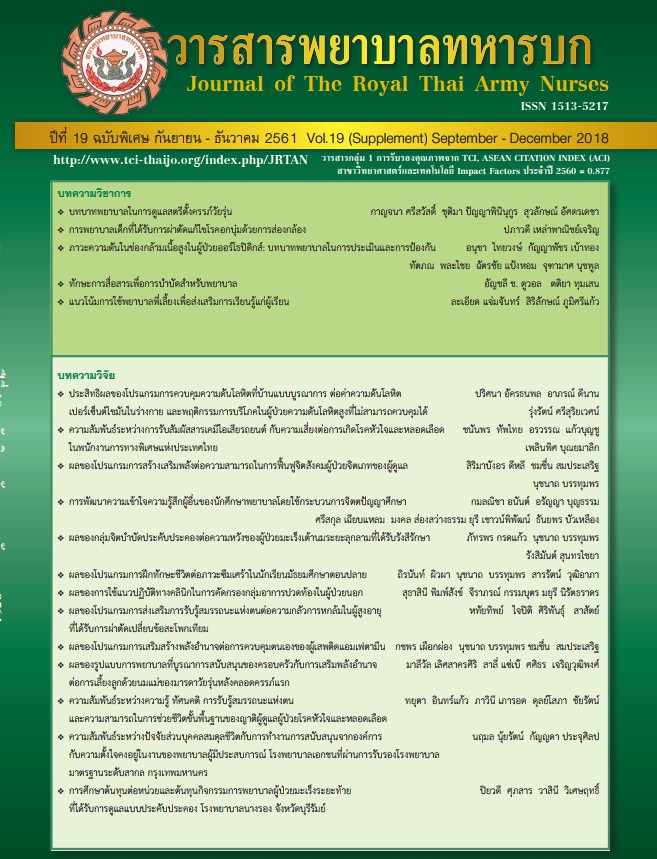The Effect of Humanitude Care by Caregiver on Agitation Behaviors of Older People with Dementia
Keywords:
Dementia, Agitation behaviors, Humanitude care, Older people, CaregiverAbstract
This quasi-experimental research used the One-Group Time Series Design. The objective to compare the agitation behaviors of older people with dementia before and after being provided humanitude care by the caregiver. The study on older people with dementia and primary caregivers totaled 16 pairs selected by purposive sampling.The method involved the provision of knowledge and practice about humamitude care (Yves Gineste & Rosettte Marescotti) to primary caregivers. The Humanitude care involves eye contact, speech, touch and verticality. The research instruments comprised: 1) data collection instruments covering personal information, mini-Mental State Examination (MMSE Thai-2002) and Cohen-Mansfield Agitation inventory (CMAI) 2) experimental instruments: Program of Humanitude Care Activities by Primary Caregivers, Humanitude Knowledge Test, Humanitude Care Assessment and a telephone follow-up form. Analysis was conducted using one-way repeated measure ANOVA and pairwise comparison method were used to assess this experiment. The result shows that the mean or average of agitative behavior after providing humanitude care knowledge and procedure decreased significantly from the first time measured at the level of p < 0.1. and it also continuously decreased significantly during 1, 2, 3, 4 and 5 weeks at the level of p < 0.1.
Downloads
References
2. Seitz D, Purandare N, Conn D. Prevalence of psychiatric disorders among older adults in long-term care homes: a systematic review. International Psychogeriatrics. 2010; 22(07): 1025-1039.
3. Charernboon T, Phanasathit M. Prevalence of neuropsychiatric symptoms in Alzheimer’s disease: a cross-sectional descriptive study in Thailand. Journal of the Medical Association of Thailand = Chotmaihet thangphaet. 2014; 97(5):560-565. (in thai)
4. Cohen-Mansfield J. Agitation in the elderly. Issues in geriatric psychiatry: Karger Publishers; 1989 : 101-113.
5. Artsanthia J, Kampraw P. Modality of Care for the Older Adults in Community. Journal of The Royal Thai Army Nurses. 2014; 15 (3):123 -127. (in thai)
6. Thongwachira C, Kespichayawattana J. The effect of nursing intervention by using music and environmental adjustment on agitated beehaviors of the dementia elderly. Bangkok Thailand: Chulalongkorn University; 2010.
7. Burns A, Perry E, Holmes C, Francis P, Morris J, Howes M-J, et al. A double-blind placebo controlled randomized trial of Melissa officinalis oil and donepezil for the treatment of agitation in Alzheimer’s disease. Dementia and geriatric cognitive disorders. 2011; 31(2):158-64.
8. Figueiro M, Plitnick B, Rea M. Research Note: A self-luminous light table for persons with Alzheimer’s disease. Lighting Research and Technology. 2016; 48(2):253-9.
9. Gineste Y, Pellissier J. Humanitude: comprendre la vieillesse, prendre soin des hommes vieux: A. Colin; 2007.
10. Maxwell SE, Delaney HD. Designing experiments and analyzing data: A model comparison perspective: Psychology Press; 2004.
11. Ito M, Honda M. Improvement of Behavioral and Psychological Symptoms of Dementia (BPSD) by Comprehensive Standardized Care Methodology.
Austin J Clin Neurol. 2015; 2(9):1-2.
12. Honda M, Ito M, Ishikawa S, Takebayashi Y, Tierney L. Reduction of behavioral psychological symptoms of dementia by multimodal comprehensive care for vulnerable geriatric patients in an acute care hospital: A case series. Case reports in medicine. 2016;1-4.
Downloads
Published
How to Cite
Issue
Section
License
บทความหรือข้อคิดเห็นใดใดที่ปรากฏในวารสารพยาบาลทหารบกเป็นวรรณกรรมของผู้เขียน ซึ่งบรรณาธิการหรือสมาคมพยาบาลทหารบก ไม่จำเป็นต้องเห็นด้วย
บทความที่ได้รับการตีพิมพ์เป็นลิขสิทธิ์ของวารสารพยาบาลทหารบก
The ideas and opinions expressed in the Journal of The Royal Thai Army Nurses are those of the authors and not necessarily those
of the editor or Royal Thai Army Nurses Association.






